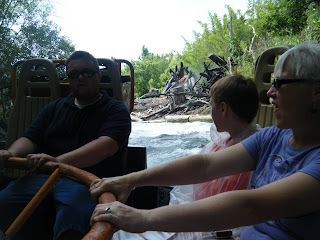Thus Sprach der Great Communicator...
In what amounted to his valedictory address at the 1988 Republican National Convention, retiring President Ronald Reagan counseled the adoring throngs, "Facts are stupid things." The quote is remarkable, for a couple of reasons: First, it is a deliberate misquote, and succinct rebuttal, of John Adam's famous line, "Facts are stubborn things." Second, it perfectly encompases the American mindset, as we stumble, Magoo-like, in the myopia of our own hubris. At the close of the 18th century, we understood that whatever our biases, whatever our personal ambitions and desires, we couldn't alter Truth. We could bash against facts all we want, attempt to bend and shape them to our own designs, but they would remain, steadfast and unassailable, demanding that we mold our designs to them.
At the close of the 20th century, we started singing a new song. Facts are mute, and mutable: they dance to the tune we set. They're "stupid things," speed bumps we bounce over on the way to where we want to be. There is no need for conformity, or compromise, or humility: what we believe is what we believe, and what we believe is the only "fact" we require.
I am participating, for the first time in my life and with no small degree of reluctance, in a school board election. My involvement in supporting one slate of candidates over another is driven by the actions of a group of people who are disciples of the "facts are stupid things" school of public discourse, piling lie on top of lie until Truth isn't merely silenced, it's suffocated.
When I was seventeen, I spent a year interning in the office of a US Congressman, representing a district in upstate New York. My internship overlapped the 1980 elections, and for a time, it was put on hold, and I worked on the congressman's re-election campaign. (The congressman was scrupulous about election laws. The congressional office was kept isolated from campaign business, and while working on the campaign, I wasn't even allowed to set foot in the congressional office.)
I learned two things that summer: I love the constituent services a congressional office provides, love helping people, love working with people in need. And I hate Hate HATE politics. Working on this campaign, even in the small and peripheral way that I have, has reminded me of how uncomfortable I am in the political arena. Sometimes, we need to do what's uncomfortable. Sometimes, we need to swallow our fear, or our distaste, or even our laziness, and we need to stand up to those who would distort the facts for their own selfish purposes.
Sometimes, we need to be as stubborn as the facts are.
Dick and Doris Grapes are legends in my hometown, and in my home ward
A few weeks ago, I wrote about Formidable Mormon Women. Today, the planet spins with one fewer of those wonderful ladies. Doris Grapes, the women who first got me interested in family history research, died yesterday morning, at age eighty-four.
Sister Grapes helped me to understand, at a very young age, that devotion to Christ meant service to others. She was a tireless worker, whether she was compiling her enormous, impeccably kept volumes of family history documents, or teaching a class in water color painting at a Relief Society meeting, or leading the singing in sacrament meeting, where she had no qualms about warning the slackers that those who didn't sing with gusto would be made to sing solos. A formidable, indefatigable, unforgettable woman.
Godspeed, Sister Grapes.



















